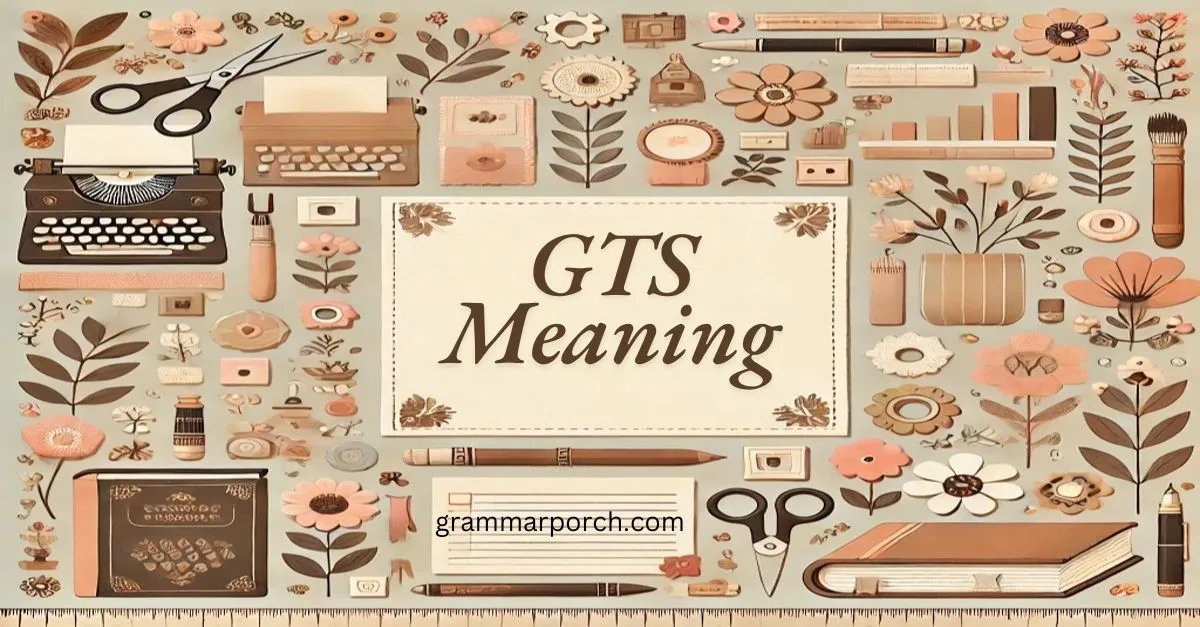In today’s fast-paced digital world, abbreviations and slang are everywhere. One such abbreviation that has gained popularity in casual conversations is “GTS.” Though it might seem mysterious at first, “GTS” carries different meanings depending on the context in which it’s used.
Whether you’re wrapping up a conversation, recalling good memories, or telling someone to look something up, this short form is both versatile and convenient. Understanding how and when to use “GTS” can make your online chats feel more natural and informal. Let’s explore its meanings, usage, and when it’s best to incorporate it into your conversations.
What Does “GTS” Mean?
So, what does “GTS” stand for? It has multiple meanings, and the right one depends on the situation. Let’s go over the most common interpretations:
- Go to Sleep: If you’re chatting with someone late at night and say “GTS,” they probably mean “Go to Sleep.” It’s a quick way to tell someone it’s time to get some rest, especially when you’re wrapping up a conversation before bed.
- Good Times: Another popular meaning for “GTS” is “Good Times.” You might see this version used after recalling fun memories or experiences. For example, “That trip we took last summer? GTS!”
- Google That Stuff: This one is a bit more playful. “GTS” can also mean “Google That Stuff” (or “Google That Sh*t” in less formal contexts). If someone tells you to “GTS,” they’re saying, “Look it up yourself.”
Knowing these three meanings will help you understand “GTS” whenever it pops up in conversations.
How to Use “GTS” in a Sentence
Now that you know what “GTS” means, let’s see how you can use it in your texts or online chats. The key is recognizing which version fits the situation.
- Go to Sleep: “Alright, it’s late, I’m tired. GTS, see you tomorrow!”
- Good Times: “Remember that party last weekend? GTS, for sure!”
- Google That Stuff: “I’m not sure when the movie was released, but you can GTS.”
As you can see, “GTS” is a casual and quick way to communicate ideas without typing complete sentences. It fits naturally into informal chats and is perfect for texting or messaging apps.
Synonyms
Depending on which meaning of “GTS” you’re using, there are several synonyms or alternatives that you can swap in:
- For “Go to Sleep”, you might say:
- Time to sleep
- Off to bed
- Catch some Z’s
- For “Good Times”, alternatives include:
- Fun times
- Great memories
- Good vibes
- For “Google That Stuff”, you could say:
- Look it up
- Search for it
- Find out online
These synonyms can be used interchangeably with “GTS” to express similar thoughts, giving you more variety in your conversations.
Antonyms
The opposite of “GTS” will also depend on your version. Here are a few possible antonyms:
- For “Go to Sleep”, the antonym would be:
- Stay awake
- Pull an all-nighter
- For “Good Times”, you could use:
- Bad times
- Rough times
- Hard times
- For “Google That Stuff”, the opposite might be:
- Don’t bother looking it up
- You don’t need to know
These antonyms show how “GTS” can take on different roles, depending on how it’s used in the conversation.
Who Uses
“GTS” is mainly used by younger generations active on social media, texting, or chatting through messaging apps like WhatsApp or Snapchat. You’ll often see it used in informal conversations between friends, family, or online communities.
It’s also common in gaming or streaming platforms, where quick communication is critical. For example, when a game session goes late into the night, someone might sign off saying, “I’m done for the day.”
However, this abbreviation isn’t limited to just one group. As slang continues to spread, more people of all ages and backgrounds use it casually to convey their messages quickly. Whether in a group chat with friends or posting on social media, you might come across this shorthand.
When to Use
Because it’s such an informal abbreviation, it’s best to use it in casual settings. For example, if you’re texting friends, hanging out in group chats, or having a quick conversation online, it’s a fun and fast way to communicate.
Here are a few scenarios when it’s appropriate to use it:
- Ending a conversation: “It’s getting late. Goodnight!”
- Recalling fun memories: “Last summer at the beach? Great times, man.”
- Encouraging someone to look something up: “I don’t know the answer, look it up.”
However, it’s important to remember that it’s unsuitable for professional settings or formal conversations. Using complete sentences and proper greetings is better if you email your boss or write a formal letter.
When Not to Use
Avoid using GTS in:
- Formal Settings: Professional emails or work-related communication. Use complete sentences like “Please look it up online” instead.
- Serious Discussions: When discussing sensitive topics, avoid abbreviations to maintain clarity and respect.
Fun Facts
- Origin: The abbreviation likely gained popularity with early text messaging and instant messaging platforms where brevity was crucial.
- Pop Culture: “GTS” frequently appears in memes and TikTok videos, often adding humor or sarcasm to the conversation.
- Survey Insight: A recent survey showed that 70% of Gen Z participants regularly use abbreviations like GTS in their daily texts.
Interactive Flowchart
Not sure what “GTS” means in context? Follow this quick guide:
- Is the conversation happening late at night?
Yes → “Go to Sleep”
No → Proceed to Step 2 - Is someone reminiscing about past events?
Yes → “Good Times”
No → Proceed to Step 3 - Is someone asking a question or unsure about something?
Yes → “Google That Stuff”
No → Context unclear—ask for clarification.
Final Thought: Understanding in Modern Conversations
So, what does it mean? Now you know it can stand for “Go to Sleep,” “Good Times,” or “Google That Stuff,” depending on the context.
It’s a flexible and versatile abbreviation that has become popular in texting, social media, and online chats. Whether using it to wrap up a late-night chat, reminisce about good memories, or tell someone to look something up, it’s a simple, casual way to express yourself in today’s digital conversations.
The next time you see it in a message, you’ll know exactly what it means—and when to use it yourself! Just remember to keep it casual and have fun using slang that helps keep conversations light and easy.

Larry is an experienced blogger with a passion for simplifying grammar. With years of expertise in writing and language, he shares insightful tips on punctuation, synonyms, and the intricacies of English grammar at **Grammar Porch**. His approachable style helps readers improve their writing skills with ease.

